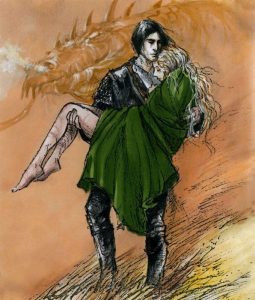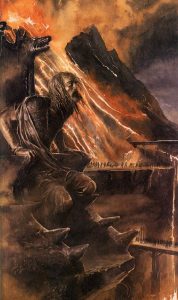In a previous Silmarillion post, we talked about the great houses of Elves and some of their notables. Given J.R.R. Tolkien’s (basically) biased bent towards humanity as Illuvatar’s favorites, it follows naturally that there is also a tremendous lineage of mankind and its heroes in The Silmarillion. There is, and we’ll cover the houses of Men very quickly, but then we’re going to move onto mankind’s greatest figure in The Silmarillion, the man Hurin.
The Great Houses of Men
Mankind was the second race created by Illuvatar himself, and they are called the Secondborn (Atani in Quenya, and Edain in Sindarin) by the Elves. Men first awoke far to the east in Hildorien. When the sun rose for the first time, many of them began wandering westward (towards the sun, actually… Apparently things work differently in Middle Earth) and eventually came to the land of Beleriand, where the Elves dwelled. There is textual evidence in The Silmarillion that the dark lord Morgoth came to the young race and incited them to worship him instead of Illuvatar, and that many complied.
Those that didn’t, and who came into the west, were divided into three main houses. The first to enter into the Elves dominion was the House of Beor. The second was the House of Haladin. The third house was led by Marach, and later his descendant Hador, and is known by both of those names. This third house became the greatest, and out of it came Hurin, the greatest Man of the First Age.
Hurin, The Greatest Man of the First Age
In many ways, Hurin is described as the human version of Feanor – fair-faced, golden-haired, strong-bodied, with a fiery mood. He was a mighty warrior, once chasing and slaughtering Orcs back to their holes after the death of his father, with “a fire in him that made the sword hot in his hand.” On another occasion he fought in a battle with a union of men and elves, and the union lost. Hurin and his brother, Huor, made a last stand to allow Turgon, and Elven king of the Noldor, to escape. Huor and all of the men with them were killed, but Hurin fought on until his battle axe broke, and he was buried under a small mountain of slain orcs and trolls.
His life, ultimately, was a sad one. During the battle where Hurin ended up buried in slain enemies, he was captured by the chief Balrog, Gothmog. He was then chained (or trapped in an enchanted chair of some sort…) to the peaks of Thangorodrim, the mountains guarding Morgoth’s fortress Angband. He was chained there for 28 years and then released. And it’s during those 28 years that things really got terrible for Hurin, because he could see and hear what was happening with his family, but only what Morgoth wanted him to see. And it was awful…
The Children of Hurin
Hurin’s children were named Turin and Nienor, and their lives were like the worst Greek tragedy you can imagine. (Fun fact: it is actually based on a Finnish tragedy. Tolkien was very culturally competent…) It’s a long story. So long that, to date, The Children of Hurin is the only complete tale from Tolkien’s legendarium to be published as a standalone book.
If you’re a casual reader, I know this will sound incredible, but here’s the short version, in bullet point format:
- Turin gets sent to the Elvish kingdom of Doriath for
![silmarillion hurin turin nienor]()
Image Source protection after his father Hurin is captured. Morwen (Turin’s mom) stays behind to give birth to Turin’s sister Nienor.
- At 20, Turin flees Doriath after accidentally killing one of King Thingol’s advisors; he joins up with some outlaws, eventually running their outfit.
- After being captured by some orcs, Turin accidentally kills his best friend Beleg when Beleg tries to rescue him.
- Turin’s outlaws head to Nargothrond, another great elvish kingdom; he eventually rises to a place of great influence. He convinces the elves of Nargothrond to build a massive bridge across the river into their kingdom, announcing their presence to the world. Orcs, led by the dragon Glaurung, assault Nargothrond, and it is destroyed; Glaurung takes up residence there; Finduilas, the elf maiden that Turin loves, is captured and later killed.
- Glaurung ensnares Turin in his gaze, and deceives him into thinking his mother and sister are in danger. He races home, only to find Morwen and Nienor gone; the went to Doriath, only to find Turin not there.
- Meanwhile, Morwen and Nienor hear of Nargothrond’s destruction, and set out in search of Turin.
- Nienor is also ensnared by Glaurung, who makes her forget her entire personal history.
- Turin finds Nienor at the grave of Finduilas; not knowing who she is (and her not being able to remember herself, either) they promptly fall in love. They eventually marry and conceive a baby.
- Glaurung the dragon attacks again, and Turin sets an ambush for him. Turin mortally wounds Glaurung, but is also mortally wounded himself.
- Nienor comes to look for Turin, and with his dying breath Glaurung undoes the magic that made Nienor forget who she was; she promptly kills herself in her anguish.
- Turin wakes up, sees what happened, and throws himself on his own sword in madness.
Wait, isn’t this post about Hurin…?
Yep. Don’t forget – during all of this drama with Turin and Nienor, Hurin was alive and forced to watch all of the horrible things his children went through. He left Thangorodrim a grizzled, grim, hopeless man, though still formidable in a fight.
He returned to his homeland, only to find that the entire house of Hador had been killed, driven off, or enslaved.
He returned to Gondolin and cried out to Turgon, whose life he had saved 28 years before, for shelter. But he found the gates of Gondolin closed to him, and all he succeeded in doing was alerting Morgoth to Gondolin’s location.
He traveled to Nargothrond, site of so much grief for his children, and killed the dwarf who had taken up residence there. He took the dragon’s treasure to Doriath and sarcastically gave it to Thingol as a fee for taking “good care” of his family, thus passing on the dragon’s curse to that kingdom.
And eventually, after some kind words from Thingol’s wife Melian, Hurin’s grief- and anger-clouded mind was cleared, and he saw that all the deeds of his life had only served to aid Morgoth. In despair, he cast himself into the sea and drowned. Thus ended the long, sad life of Hurin.
A Consequential Life
It’s easy to overlook Hurin and focus on his children, but let’s do a quick rundown of the major events that he was a part of, even if only indirectly:
- Aided Gondolin in a time of great need
- Directly led to Gondolin’s destruction by revealing its location
- Had a great relationship with King Thingol of Doriath
- Passed on the curse of Glaurung’s treasure to King Thingol, indirectly leading to Doriath’s destruction
- His son Turin was a mighty warrior who did much good
- Turin also married and conceived a child with his sister, was demonstrably responsible in the deaths of basically everyone who loved him, and directly contributed to the destruction of Nargothrond
So, yeah, Hurin’s life was consequential. Horrific, tragic, destructive, and consequential.



